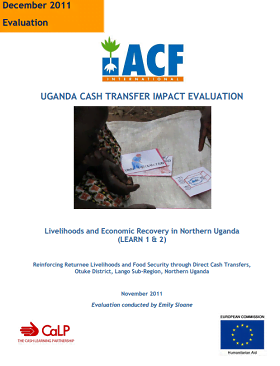UGANDA CASH TRANSFER IMPACT EVALUATION
Numerous evaluations have examined different aspects of the LEARN projects since their inception. This report is the first to focus on the impact of cash transfers on household-level food security and livelihoods. Previous reports suggested that it would take time for this impact to be measureable, since beneficiaries would first need to capitalize on the assets they had acquired (e.g., by training bulls for use as oxen). The current report allows for an assessment of household-level impacts 22 months and 12 months after the final cash transfers from LEARN 1 and 2, respectively.
Data on the dietary diversity and health, food production and food sources, savings and credit, and income and expenditure was collected during surveys conducted in November 2011. Through stratified random sampling, beneficiary households from LEARN 1 and 2 were chosen to participate in the survey. During an 11-day period, the survey team conducted 478 household surveys. The resultant data was compared with available baseline and endline data. Two focus group discussions and debriefing sessions with the survey team helped to provide a more nuanced understanding of the results.
The findings from this evaluation provide compelling evidence that cash transfer projects can contribute to substantial improvements in household food security and livelihoods in postconflict recovery contexts. Lessons learned and recommendations for the implementation of similar interventions will support the improvement of cash-based interventions both in northern Uganda and more broadly for ACF and other humanitarian institutions’ programs in the future.



